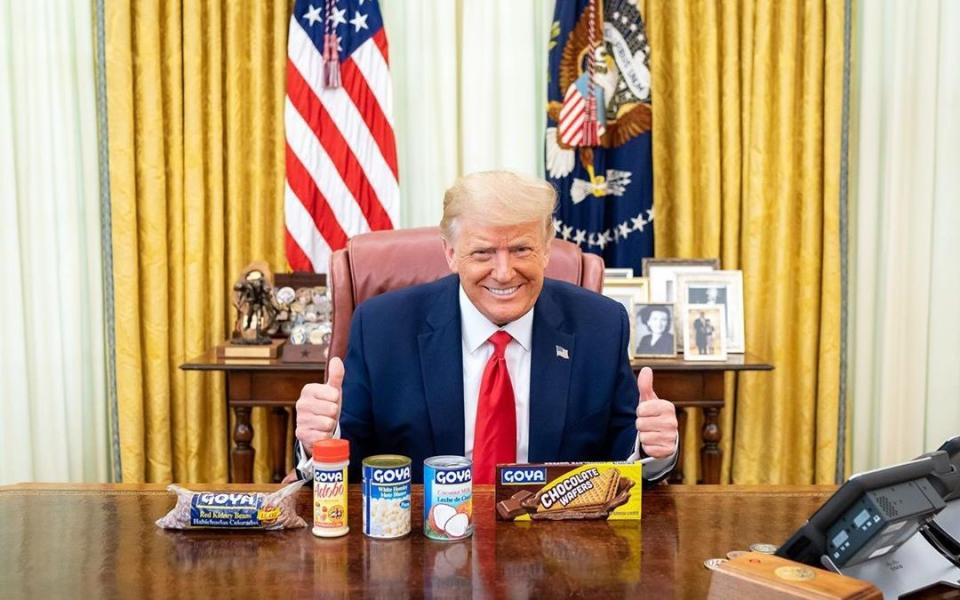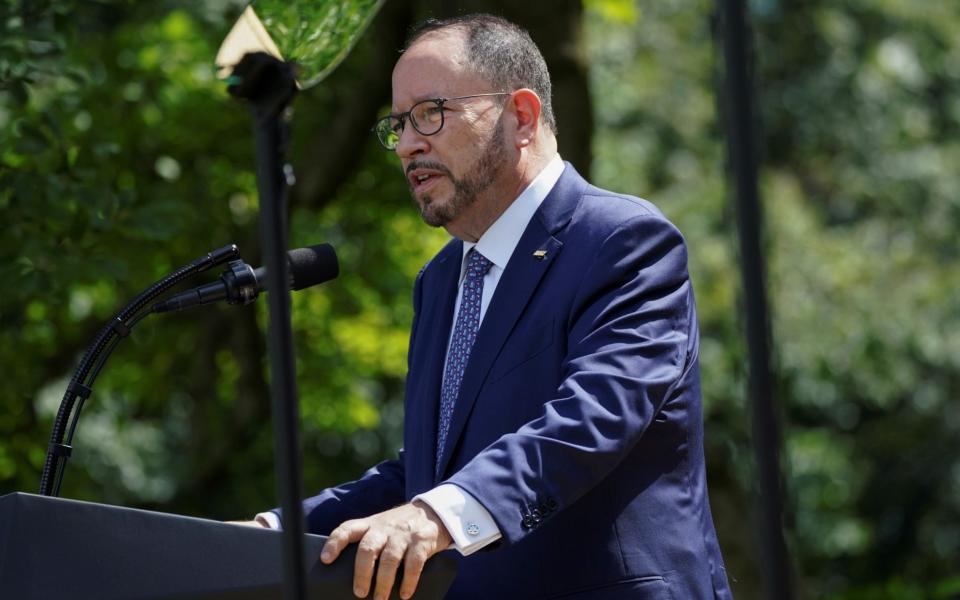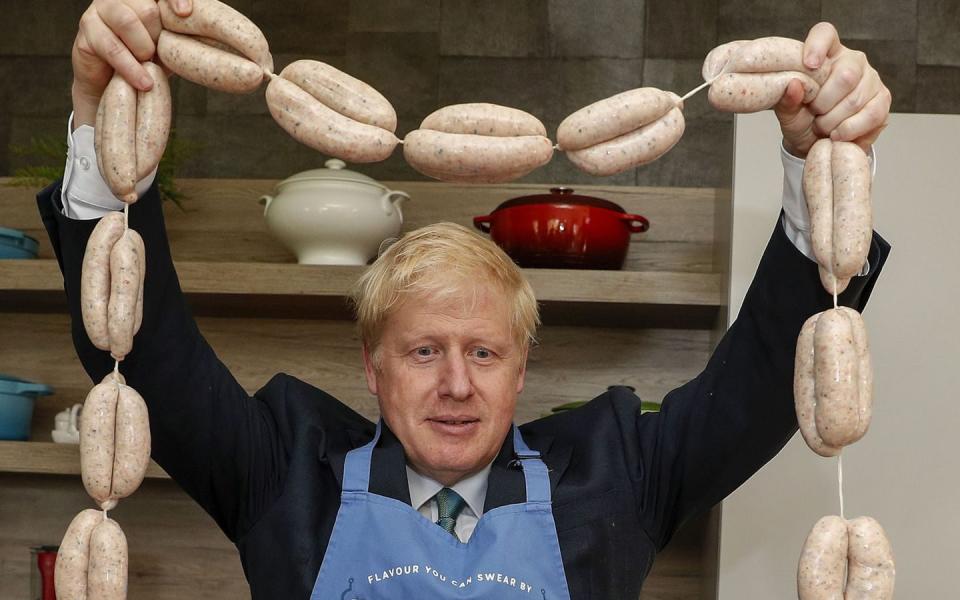Beans, boycotts and bangers prove that food brands and politics are a recipe for trouble

There is no such thing as bad publicity, they say. But the Unanue family, owners of Goya Foods, the American food brand whose tinned beans and Hispanic goods are a staple of Latino larders, must now be wondering about the truth of that.
Goya hit the headlines last week when CEO Robert Unanue, whose family are said to be worth $1.1 billion, went to the White House to announce that the company was donating a million cans of its chickpeas, along with 500 tons (about 453 metric tonnes) of other food, to American food banks.
But while Unanue deals with pulses by the hundredweight, he hasn’t necessarily kept his finger on the political one. His comment on the White House lawn, that "Americans are truly blessed to have a leader like Donald Trump” went down with many in the Hispanic community like a lead balloon.
After all, this is the leader who has publicly depicted Mexican immigrants – by implication much of Goya’s core market – as criminals.

Leading Hispanic figures rushed to declare that they were boycotting Goya products, including former presidential candidate Julian Castro, who wrote, “Goya Foods CEO is free to support a bigoted president who said an American judge can’t do his job because he’s Mexican, who treats Puerto Rico like trash, and who tries to deport Dreamers.
"We’re free to leave his products on the shelves. #Goyaway."
The hashtag is still trending.
The Trumps fought back. Ivanka Trump tweeted “If it’s Goya it’s good,” along with a picture of herself posing with a tin of Goya black beans.
If it’s Goya, it has to be good.
Si es Goya, tiene que ser bueno. pic.twitter.com/9tjVrfmo9z— Ivanka Trump (@IvankaTrump) July 15, 2020
Cue accusations of political figures breaking ethical codes, a view summed up by Walter Shaub, who directed the U.S. Office of Government Ethics from 2013 to 2017, and who tweeted: “It creates the appearance that the government's endorsement is for sale. Endorse the president and the administration will endorse your product.”
And then, of course, Donald Trump waded in with a picture of himself at the historic Resolute desk in the Oval Office, displaying five Goya products while giving a double thumbs up.
Whatever next? The Prime Minister promoting sausages? The Chancellor giving a teabag maker a massive plug? Oh yes – back in 2019, Johnson was photographed festooned with strings of pork products and holding a pack of special “Boris bangers” at the Heck factory in Yorkshire.

Cue jokes about Boris "selling porkies" and (more seriously for Heck) cries of hypocrisy after it turned out that the company founder Debbie Keeble had gone on record a couple of years earlier, describing Brexit as “cataclysmic”. Heck were compelled to apologise following a social media storm in which a large number of vocal Twitter users vowed to boycott the brand.
And then there was #teagate, when Rishi Sunak was photographed in Febuary this year with a very large bag of Yorkshire Tea. Now, of course his choice of brand could have simply been a reference to his constituency roots – he is MP for Richmond in North Yorkshire – but nonetheless his perceived endorsement caused an online pile-on, with threats to stop buying the tea, and a plea from the Yorkshire Tea media team (who were surprised to find themselves in the firing line) to tweet, “for anyone about to vent their rage online, even to a company – please remember there’s a human on the other end of it, and try to be kind.”
Quick Budget prep break making tea for the team. Nothing like a good Yorkshire brew. pic.twitter.com/zhoQM9Ksho
— Rishi Sunak (@RishiSunak) February 21, 2020
Accidental political endorsements are one thing, but when brands deliberately meddle with – or attempt cash in on –political movements, things can get even more messy. Pepsi’s April advertisement which showed model Kylie Jenner handing a can of Pepsi to a police officer at a demonstration was pulled after accusations that it trivialised the Black Lives Matter movement.
Yet some companies have made political engagement an intrinsic part of their brand. Ice-cream makers Ben & Jerry’s has a long history of left-wing engagement, with flavours like Pecan Resist, launched to coincide with the 2018 midterm elections, in support of “women, immigrants, people of color, & the millions of activists and allies who are courageously resisting the President's attack on our values, humanity & environment.”
The company’s stock rose in the following weeks, showing that planting your political flag may be financially savvy – if you do it right.
Yorkshire Tea certainly seems to have learnt from its brush with No 11. Since #teagate, the Yorkshire Tea team replied to a tweet suggesting they didn’t support Black Lives Matter: “Please don't buy our tea again. We're taking some time to educate ourselves and plan proper action before we post. We stand against racism. #blacklivesmatter.”
Please don't buy our tea again.
We're taking some time to educate ourselves and plan proper action before we post. We stand against racism.
#BlackLivesMatter— Yorkshire Tea (@YorkshireTea) June 8, 2020
The unequivocal response has boosted their reputation, so much so that PG Tips joined in with, "If you are boycotting teas that stand against racism, you’re going to have to find two new tea brands now. #blacklivesmatter #solidaritea.”
As for Robert Unanue, it remains to be seen whether he will be so ready to spill the political beans again, and whether his customers will forgive him.

 Yahoo News
Yahoo News 